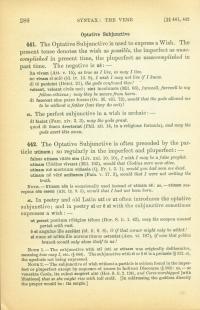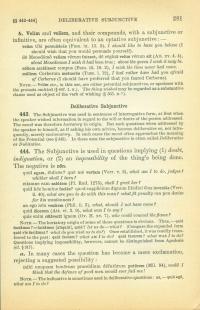441. The optative subjunctive is used to express a wish. The present tense denotes the wish as possible, the Imperfect as unaccomplished in present time, the pluperfect as unaccomplished in past time. The negative is nē.
Ita vīvam (Att. 5.15)
As true as I live, so may I live
Ne vīvam sī sciō. (id. 4.16.8)
I wish I may not live if I know.
Dī tē perduint! (Deiot. 21)
The gods confound thee!
Valeant, valeant cīvēs meī; sintincolumēs. (Mil. 93)
Farewell, farewell to my fellow citizens; may they be secure from harm.
Dī facerent sine patre forem! (Ov. M. 8.72)
Would that the gods allowed me to be without a father!
(but they do not)
a. The perfect subjunctive in a wish is archaic.
Dī faxint. (Fam. 14.3.3)
May the gods grant.
Quod dī ōmen āverterint. (Phil. 12.14, in a religious formula)
And may the gods avert this omen.
442. The optative subjunctive is often preceded by the particle utinam; so regularly in the imperfect and pluperfect.
Falsus utinam vātēs sim (Liv. 21.10.10)
I wish I may be a false prophet.
Utinam Clōdius vīveret. (Mil. 103)
Would that Clodius were now alive.
Utinam mē mortuum vīdissēs. (Q. Fr. 1.3.1)
Would you had seen me dead.
Utinam nē vērē scrīberem (Fam. 5.17.3)
Would that I were not writing the truth.
Note— Utinam nōn is occasionally used instead of utinam nē
utinam susceptus nōn essem (Att. 9.9.3)
Would that I had not been born.
a. In poetry and old Latin utī or ut often introduces the optative subjunctive; and in poetry sī or ō sī with the subjunctive sometimes expresses a wish.
Ut pereatpositum rōbīgine tēlum. (Hor. S. 2.1.43)
May the weapon unused perish with rust.
Ō sī angulus ille accēdat! (id. 2.6.8)
O if that corner might only be added!
Sī nunc sē nōbīs ille aureus rāmus ostendat. (Aen. 6.187)
If now that golden branch would only show itself to us!
Note 1— The subjunctive with utī (ut) or utinam was originally deliberative, meaning How may I?, etc. (§ 444). The subjunctive with sī or ō sī is a protasis (§
Note 2— The subjunctive of wish without a particle is seldom found in the Imperfect or Pluperfect except by sequence of tenses in indirect discourse (§ 585).
ac venerāta Cerēs, ita culmō surgeretaltō (Hor. S. 2.2.124)
and Ceres worshipped [with libations] that so she might rise with tall stalk
[In addressing the goddess directly the prayer would be: ita surgās]
b. Velim and vellem, and their compounds, with a subjunctive or infinitive, are often equivalent to an optative subjunctive.
Velim tibi persuādeās. (Fam. 9.13.2)
I should like to have you believe
(I should wish that you would persuade yourself).
Dē Menedēmō vellem vērum fuisset, dē rēgīnā velim vērum sit. (Att. 15.4.4)
About Menedemus I wish it had been true; about the queen I wish it may be.
Nōllem accidisset tempus. (Fam. 3.10.2)
I wish the time never had come.
Māllem Cerberum metuerēs. (Tusc. 1.12)
I had rather have had you afraid of Cerberus
(I should have preferred that you feared Cerberus).
Note— Velim etc., in this use, are either potential subjunctives, or apodoses with the protasis omitted (§ 447.1, Note). The thing wished may be regarded as a substantive clause used as object of the verb of wishing (§ 565, Note 1).


